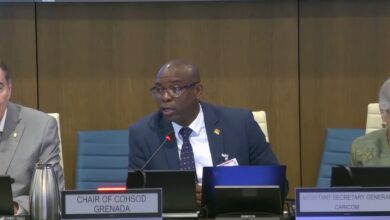PUBLIC Health is being placed high on the agenda as regional leaders meet in Grenada for the Thirty-Eighth Regular Meeting of the Conference of Heads of Government of the Caribbean Community (CARICOM).
The conference will open today with a grand ceremony at the Grenada Trade Centre, subsequent to which Heads of Government will move to the Radisson Grenada Beach Resort, in Grand Anse, for two days of business sessions.
On Monday, while addressing journalists from across the region, CARICOM Secretary-General, Ambassador Irwin LaRocque said that health matters will feature prominently during the conference, with a specific focus on Non-Communicable Diseases (NCDs).
This year marks 10 years since the Caribbean Community adopted the Port of Spain Declaration aimed at “Uniting to Stop the Epidemic of Chronic NCDs”.
According to Ambassador LaRocque, non-communicable diseases such as cancer, diabetes and stroke are the main causes of death in the Caribbean region, and today remain a major concern to the Caribbean Leaders.
“I have seen some estimates that suggest that NCDs cost our region anywhere between two and five per cent of GDP,” he said, adding:
“So while it has an impact on an individual’s health, it also has an impact on the State and its ability to provide support for those suffering from NCDs.”
Even as a study is being carried out to investigate ways to reduce NCDs such as diabetes and high blood pressure,which are responsible for more than 60 per cent of deaths in the Caribbean, Ambassador LaRocque said what may very well be of help is a change in lifestyle.
“Lifestyle; what we eat, how we eat, when we eat is a major contributing factor to our state of health,” he said, adding that Caribbean nationals tend to eat a lot of fast foods or those that are high on salt, fat and cholesterol.
“We don’t exercise enough,” he said, adding that the damaging effects of smoking and second-hand smoke cannot be understated.
Under the Port of Spain Declaration,CARICOM Member States pledged their full support for the initiatives and mechanisms aimed at strengthening regional health institutions, in addition to the provision of critical leadership for implementation of the agreed strategies for the reduction of the burden of Chronic, Non-Communicable Diseases.
As such, the Caribbean Cooperation in Health Initiative Phase III (CCH III), which seeks to address the issue of NCDs, is being coordinated by the CARICOM Secretariat, with able support from the Pan American Health Organisation/World Health Organisation (PAHO/WHO) and other relevant partners.






